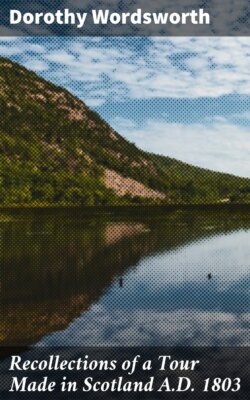Читать книгу Recollections of a Tour Made in Scotland A.D. 1803 - Dorothy Wordsworth - Страница 5
На сайте Литреса книга снята с продажи.
ОглавлениеThere is one entry, the last in the Journal, made as late as 1832, which alludes to a fact which, but for this note, might have been left without comment. [0c] Throughout the whole tour no distinction seems to have been made between Saturday and Sunday. One would have thought that, if nothing else, sympathy at least, which they did not lack, would have led Wordsworth and his sister to turn aside and share the Sabbath worship of the native people. Even the tired jade might have put in his claim for his Sabbath rest; not to mention the scandal which the sight of Sunday travellers in lonely parts of Scotland must then have caused, and the name they must many a time have earned for themselves, of ‘Sabbath-breakers.’ This last entry of 1832, however, marks a change, which, if it came to Dorothy, came not less decidedly to her brother. This change has been often remarked on, and has been stigmatised by ‘the enlightened ones’ as ‘the reaction.’ They say that the earlier nature-worship, which they call Pantheistic, speaks the true and genuine man; the later and more consciously Christian mood they regard as the product, not of deepened experience, but of timidity, or at least as the sign of decreasing insight. It is not so that I would interpret it. Wordsworth and his sister, with their rare gift of soul and eye, saw further into nature, and felt it more profoundly than common men can, and had no doubt found there something which the gross world dreams not of. They recovered thence a higher teaching, which men for ages had lost. They learnt to think of God as being actually very near to them in all they saw and heard; not as the mechanical Artificer, who makes a world and then dwells aloof from it, but as
‘The Being that is in the clouds and air,
That is in the green leaves among the groves.’
In nature, which to most eyes is but a dull lifeless mass, impelled by dead mechanic movements, their finer spirits were aware of a breathing life, a living Presence, distinct, yet not alien from, their own spirits, and thence they drank life, and strength, and joy. And not in nature alone, but from their own hearts, from the deep places of their moral nature, and from their minglings with their fellow-men, they could oftentimes overhear
‘The still sad music of humanity,
Nor harsh nor grating, though of ample power
To chasten and subdue.’
And through this they learned to feel for themselves, and not conventionally, the upholding presence of One on whom the soul’s ‘dark foundations rest.’ Likely enough, in the prime of their strength they may have imagined that these teachings coming from nature and from man were in themselves enough.
But when sorrow and bereavement came, and with them the deepened sense of sin and of utter need, they learned that in nature alone was nothing which in the end they could abide by. They had been true to the lights they had, and they were led on to higher. They were led to go beyond nature and man for their ultimate support, and to overhear from that higher region another, diviner ‘tone, into which all the strains of this world’s music are ultimately to be resolved.’ The Poet, nor less his sister, came at length to feel, what philosophers find so hard to believe—that The Being whom he had long known as near him in the solitudes of nature, as close to the beatings of his own heart, was He who had so loved him as to die for him. True it is that this later and more distinctly Christian experience is but faintly reflected in Wordsworth’s poetry compared with the earlier naturalistic mood. But this is explained by the fact that before the later experience became prominent, the early fervour of poetic creation had already passed. Not the less for this, however, was the poet’s later conviction a riper, more advanced wisdom—not a retrogression.
J. C. Shairp.
Cuilaluinn, June 1874.
